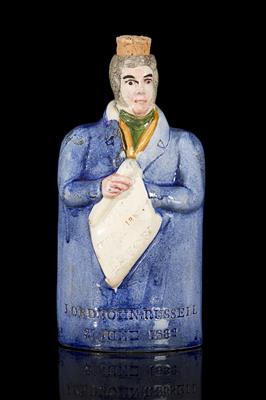Reform whisky jug
Download media
Object number03364
TitleReform whisky jug
DescriptionThis small, earthenware whisky jug was made in 1832 to commemorate the passing of the first Reform Act. It takes the form of Lord John Russell, who introduced the bill to parliament in 1831 – if you look closely you can see he is holding a copy of the act itself. The jug was made at the Portobello Pottery, to the east of Edinburgh.
Portobello became one of the main places for ceramic production in Scotland from the mid-18th century. It was the perfect spot: there were local supplies of coal and clay, and its position on the Firth of Forth meant that the finished goods could easily be exported.
In the early decades of the 18th century, Scotland was in upheaval. The end of the Napoleonic Wars in 1816 saw a huge number of men returning from the continent, looking for work. The Corn Laws of 1815 had pushed up prices and wages were devalued. The 1819 Peterloo Massacre in Manchester had stoked resentment. The working man felt powerless and put-upon, there was unrest and rebellion.
By 1830, the Whig government was able to act. Lord John Russell was part of a ministerial committee that drew up the first Reform Bill, which was successfully passed in 1832. It brought in constituency reform and extended the franchise – in Scotland, 60,000 men were given the vote. Stirling celebrated by lighting up the town, ringing church bells and decorating shops.
The 1832 Reform Act still excluded 400,000 adult men and all women in Scotland. The fight continued for almost another 100 years: it was only in 1928, with the Representation of the People Act, that all adults were given the right to vote, regardless of age, status or gender.
Production placePortobello,Edinburgh,Scotland
Production date 1832
Object nameFlask, Whisky Jar
MaterialEarthenware

